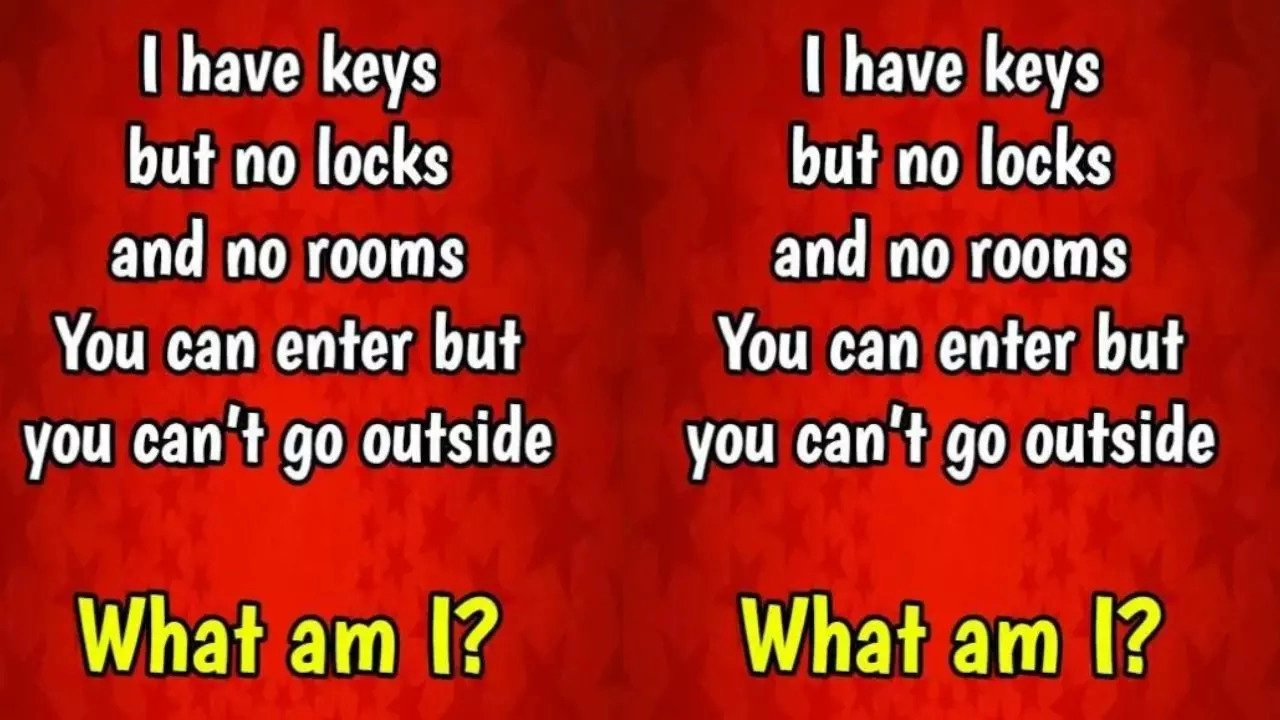Pallavi Mehra • 11 Sep 2024
Brain Teaser Riddle Of The Day: “I Have Keys, But No Locks And No Rooms - What Am I?’

Brain Teaser Riddle Of The Day: “I Have Keys, But No Locks And No Rooms - What Am I?’ (Image Credits: Pinterest)
In today's fast-paced world, we often find ourselves overwhelmed by daily tasks and challenges, but something is refreshing about taking a step back and engaging in a mental puzzle. Brain teasers, riddles, and challenges are great ways to stimulate your mind, spark curiosity, and test your problem-solving skills.
Riddles like this are more than just fun wordplay; they push us to think outside the box. By interpreting words and phrases in new ways, you can arrive at an answer that may seem obvious in hindsight but feels elusive at first.
This brain teaser cleverly uses language to mislead your assumptions. Many riddles play on words or double meanings, making them challenging to solve, but once you “get it,” the sense of satisfaction is undeniable.
One riddle that’s been circulating lately has people scratching their heads—and it might just stump you too. Ready for the challenge?
The Riddle:
‘I have keys, but no locks and no rooms.
You can enter, but you can’t go outside. What am I?’
Take a moment to think about it. It’s a tricky one, isn’t it? At first instance, it might seem like an impossible puzzle, but with a bit of creative thinking, the answer is right in front of you!
This classic riddle has puzzled many, but it all comes down to interpreting the clues unexpectedly. Let’s break it down and understand it.
Breaking Down the Riddle:
- “I have keys”: When you hear the word “keys,” your mind might immediately go to something that unlocks doors or perhaps even a piano with its keys arranged in neat rows. But hold on, neither locks nor doors are involved here.
- “But no locks and no rooms”: Here’s where it gets tricky. Whatever this object is, it has keys, but it doesn’t lock anything, nor does it have rooms—so it’s not a traditional key.
- “You can enter, but you can’t go outside”: This line offers another clue. Whatever the object is, you can “enter” something, but there’s no way to leave. You’re entering, but not in the physical sense of going through a door.
Are you starting to see it yet?
The answer to the riddle is a keyboard!
The Explanation:
- The keys: A keyboard has keys just like a piano, but these keys don’t unlock anything. Instead, they’re used to input letters, numbers, and symbols into a computer or device.
- No locks and no rooms: Unlike traditional keys, which are used for locks and doors, a keyboard’s keys are purely functional for typing and controlling a device. There’s no “room” to be unlocked or entered in the literal sense.
- You can enter, but you can’t go outside: The word “enter” here refers to the “Enter” key on the keyboard, which is pressed to input data or commands into a computer. You “enter” information into the system, but there’s no physical space to leave—just a digital interface.
Brain Teasers Health Benefits:
Engaging in riddles and brain teasers is more than just a fun pastime; it also has cognitive benefits. Studies show that regularly challenging your brain with puzzles, riddles, and mental exercises can improve memory, enhance problem-solving skills, and even delay age-related cognitive decline.
Here’s how riddles help boost brainpower:
- Critical thinking: Solving a riddle forces you to analyze the clues carefully and think critically about potential solutions.
- Creativity: Many riddles require thinking in non-linear or abstract ways, helping to nurture creativity.
- Attention to detail: Riddles often rely on subtle wording or hidden clues, making it essential to pay close attention.
- Patience and perseverance: Some riddles aren’t solved in a matter of minutes, and they encourage you to stick with a problem until you find the solution.
Get Latest News Live on Times Now along with Breaking News and Top Headlines from Mental Health, Health and around the world.